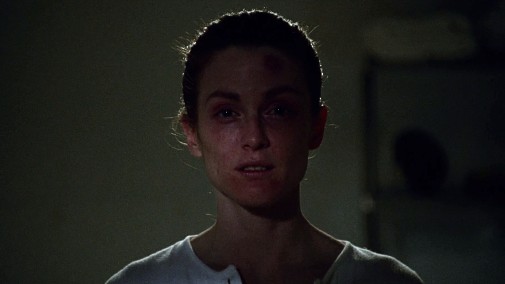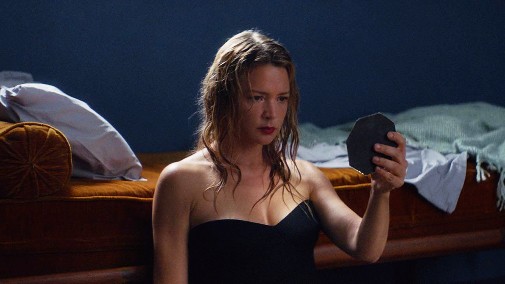The festival is past its midpoint, and it's looking like this'll be a banner year. At least, that's the general tenor of the international coverage. The films of the moment offer a wide variety of cinematic approaches. Ramata-Toulaye Sy's debut feature Banel & Adama is being lauded for its rich visuals, while many have declared Todd Hayes's May December as a return to form with juicy acting across the board. And yet, one feels that the Cannes Best Actress frontrunner is neither Portman nor Moore, but Sandra Hüller, who dazzled viewers in Justine Triet's Anatomy of a Fall. Finally, Karim Aïnouz's first English-language feature Firebrand (starring Alicia Vikander and Jude Law) is an outlier earning harsh reviews.
For this Cannes at Home chapter, we consider Our Lady of the Nile which is not directed by Sy, but she co-wrote the script with the director. Then, let's explore Haynes' first Moore movie Safe, Triet's main competition debut Sibyl, and Aïnouz's sensual Love for Sale. They all tell stories about the feminine experience, from imperiled schoolgirls to sexually liberated women…

OUR LADY OF THE NILE (2019) Atiq Rahimi
The Rwandan genocide of 1994 haunts this adaptation of Scholastique Mukasonga's novel, Our Lady of the Nile. Not that the story considers that tragedy or even its aftermath. Instead, we're transported to 1973, to an elite Catholic school for girls where the ethnic tensions that will ravage the country twenty years later are already an insidious force, palpable to those paying enough attention. Divided into three chapters – Innocence, Sacred, and Sacrilege – what starts like a view of youthful utopia and imagination soon degrades, becoming a pandemonium that blossoms in the fertile ground of hate. Still, neither the direction nor the script wishes to dwell on unwavering anguish.
They find modulation and even moments of euphoria in an arc bound to end in bloodshed, peaking into the girls' private universes and community. A particular scene is reminiscent of Jean Vigo's Zèro de Conduite, with feathers flying through the air. But, of course, no light can keep the shadow at bay forever. At first sublimated in stories from home, national unrest interferes, and class hierarchies are perpetuated, sometimes twisted, within the student ecosystem. A coup d'état will eventually disrupt the insular environment beyond repair, though terror spreads before that through lies, through the scars of colonial rule, through the gazes of dangerous men. From heaven to hell, it's a despairing journey, made more crushing by that first brush with the celestial.
Sadly, Our Lady of the Nile is currently unavailable for streaming in the US. It is, however, streaming in some other countries – France, for example.

SAFE (1995) Todd Haynes
When studying Todd Haynes' filmography, one might wonder why he never directed a horror picture. His earliest short, The Suicide, has a dark tonality while the never released but widely shared Superstar contorts the nightmarish into a conduit for empathy. Then again, one might argue that Safe is that missing horror project, the culmination of his early short experiments. In the auteur's hands, perfect normalcy can be the most monstrous thing of all. Watch him turn a hairstylist appointment into a ritual of unthinkable dread, the prologue for a freakout straight from your worst nightmare.
Considering the film after the advent of the pandemic, its frightfulness becomes even more evident, almost inescapable. You feel your throat closing up as a body rebels before your eyes. Not your own but that of a woman for whom the world is a corrosive agent, eating away the human until only a panicked animal remains. Continue that devolution, and you might reach a state where humanity is regained or transcended into another thing altogether. It's an enigma that feels un-mysterious, for you feel the reality of Julianne Moore's performance in your gut. She's the perfect center unifying Haynes' impeccable formalism with his intellectual and character-based preoccupations. In her agony, you will see the elemental zenith of horror.
Safe is available on most major platforms, either for rent or purchase.

SIBYL (2019) Justine Triet
Bless Justine Triet and her women on the verge of nervous breakdowns. And bless Virginie Efira for playing them so well, be they discombobulated lawyers who take too many lovers or a frustrated psychoanalyst with writing aspirations. Sibyl is that second example, revolving around a therapist whose life becomes inexorably tangled with that of one of her patients. The object of Sybil's obsession is Margot, an up-and-coming actress experiencing turmoil on an ongoing shoot. The chaos defies summation, constantly sprouting new avenues of misery like a hydra of the Ancient World. But oh, the madness is so entertaining, a hot mess express.
The melodrama is both deconstructed and extolled by Triet's structural bravura. The intromission of memory is notorious, breaking the characters' reality, molding their tragedy into absurdity and a happy ending into a trap. Efira makes it all work, as she always does, but isn't alone as she does it. Around her, an ace cast breathes life into a palimpsest of topsy-turvy character studies capable of provoking tears and peals of laughter in equal measure. Sandra Hüller is especially hilarious as the director of the whole affair who, at her wits end, literally swims away from her own movie.
Sibyl is streaming on Hoopla, Tubi, and Kanopy. You can rent it on Amazon, Google Play, Youtube, Apple TV, and Vudu.

LOVE FOR SALE (2006) Karim Aïnouz
Hermila was born in a small town in northeast Brazil and has called it her home since then. At 21, she was seduced by a handsome man and tried to build a new life far away, in the metropolis of São Paulo, but the financial situation of the pair was untenable. Returned to her origins and pregnant, she's now stuck waiting for a boyfriend that promised to come back before vanishing into thin air. However, Karim Aïnouz's heroine won't give up, having decided to try her luck at another city. There's only one problem – she needs funds to make the trip.
Abandoned, dispossessed of other means, and living in a place with no available work, Hermila takes charge of her own body as a commodity. She'll raffle herself off, selling a Night in Paradise to the lucky man with the winning ticket. Other storytellers might dramatize this story in the fashion of grim-faced misery porn, indicting the socioeconomic system that doomed Hermila to this fate through an exultation of her pain. Aïnouz repudiates that tactic, choosing instead to depict the character's sex work as a form of liberation. Rather than looking down on its heroine, Love for Sale celebrates her resoluteness. It's no less true because of it.
The cineaste's camera goes further still, celebrating the pleasures of the flesh as a way of rebelling against whatever systems of morality might pelt judgment down on Hermila. This approach extends to every aspect of the film's form. Though attuned to the stylistic precepts of neorealism, Love for Sale is rigorously constructed with an eye toward beauty and a celebration of womanhood. It's as if Aïnouz is proposing the radical notion that such works of socially-conscious cinema can and should look joylessness in the face and spit on it. Punition has no place here, neither in story nor the viewing experience, and delight is the best pathway to revolution.
You can find Love for Sale on Amazon Video, available to rent and purchase.
Are you a fan of any of these filmmakers?